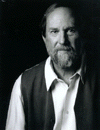The 2001 Pulitzer Prize Winners have been announced by the Pulitzer Prize Board. The winners in drama, music and poetry are all first-time winners with wonderful works that led them to recieve this prestigious honor.
The Pulitzers were first awarded in 1917 and were developed to reward excellence in journalism, writing, and education. They were developed by their namesake, Joseph Pulitzer, who left a provision for their inception in his will. The Board, using another provision of the will, has increased the number of awards to include music and poetry.
The nomination process is quite a particular one. In order for a work to be eligible, it must have been released or premiered within a year before the deadline date for nomination, which varies for each particular award. A jury is selected for each area by the Pulitzer Prize Board, and they select finalists and a winner to receive the prize, which is currently $7,500.

David Auburn
|
The drama award is given to a "distinguished play by an American author, preferably original in its source and sealing with American life." This year's winner is Proof by David Auburn. Proof is the story of a young woman, Catherine, who faces the loss of her father. Her older sister, Claire, returns home to help settle the business of the estate, and one of her father's former students shows up and discovers an old notebook. This notebook contains the details of a buried family secret. This is a story about the bond that exists between sisters, as well as first love and romance. The play is quite deserving of such an honor.

Stephen Dunn
photo: Bernard C. Meyers
|
The award for poetry is given to "a distinguished volume of original verse by an American author." This year's recipient is Different Hours by Stephen Dunn. The collection is an exploration of life and everything that surrounds it: the beyond, history, and philosophy. Dunn has written ten previous collections of poetry, all met with critical acclaim. He is a trustee fellow and professor of creative writing at Richard Stockton College in New Jersey.

John Corigliano
photo: Christian Steiner
|
Receiving the music award for "a distinguished musical composition of significant dimension by an American that has had its first performance in the United States during the year," is Symphony No. 2 for String Orchestra by John Corigliano. It premiered on November 30, 2000, at Symphony Hall in Boston, Massachusetts, and was performed by the Boston Symphony Orchestra. The symphony consists of five movements: I. Prelude; II. Scherzo; III. Nocturne; IV. Fugue; V. Postlude. Corigliano is an accomplished composer that is known worldwide and has had many works premiered by world-renowned performing groups in such places as Carnegie Hall and the Kennedy Center. The piece can be rented from G. Schirmer, Inc.
The Board has once again sought, and quite possibly found, the greatest works in writing of all sorts this year. The process is a tough one, as competition for the United States' highest honor for writing isn't given out without heavy consideration.
To view the rest of the recipients for this year, recipients for previous years, or for entry information, go to http://www.pulitzer.org.
I strongly encourage you to check out these works if you get a chance.
They are well worth it.